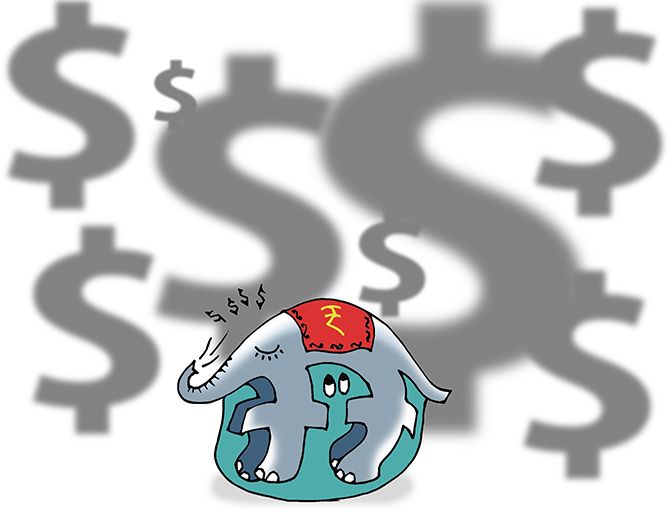A modern economy with strong global linkages must switch to million, billion and so on, says T N Ninan.
Illustration: Dominic Xavier/Rediff.com

So how big is the Indian economy this year?
If you were to put it in US dollars, the figure would be something approaching $2.5 trillion which is easy to say and write.
But if you were to put it in rupees, most people would say: About Rs 160 lakh crore, or (rarely) Rs 1.6 crore crore.
Numbers thus expressed are not only clumsy (like saying million million) but also, as a reader has pointed out, confound the logic of the Indian way of writing numbers.
This is to have a comma after every two digits beyond the initial three, and different from the international counting system which puts a comma after every three digits.
One lakh crore, if written in figures, would jumble up the two systems and state it as 1,00,000,00,00,000 -- note that there is a three-digit aberration between commas, interspersed in the sequence of two-digit demarcations.
As it happens, there is a way to express the number simply and correctly in rupees -- and that is to say Rs 16 neel (13 zeroes after 16).
The problem is that no one uses this term -- not the government, not the Reserve Bank, in fact no official or private body other than some Indian language publications which routinely use arab (for 100 crore).
Perhaps this corruption of the Indian way of counting is because, over the years, everyone got used to talking of thousands of crores.
Having got that far, it must have been a natural progression to lakh crores, and perhaps even crore crores.
Most people are probably not aware that there are Indian terms for numbers that run to more than eight digits.
Hence, Rs 20,000 crore should more correctly be written as Rs 2 kharab.
A padma would be better than 10 crore crore; and 100 padmas would be a shankh -- which in international terminology would be 100 quadrillion.
These terms are not in common usage. The question is whether they should be.
If one is to move away from today's mongrel version of counting large numbers, one should move to the proper use of Indian numerical terms, as designed; or switch to the internationally accepted system of million, billion and the rest.
The current zeitgeist would weigh in favour of reverting to the purity of the original Indian concepts, and therefore have a new term introduced with the addition of every two digits.
But this runs up against other problems.
In today’s digital world, computer programmes are automatically set to introduce a comma after every three digits -- in line with the international system and usage.
The result is that a table giving a company'’s financial results might state the sales turnover as 1,000,000 -- but note at the top of the table that all figures are in lakhs.
One has to do some mental jugglery to figure out that the figure is actually Rs 10,000 crore.
The second problem is that Indian numbers would become incomprehensible to all outsiders who already struggle with understanding lakh and crore, and who would now be asked to also be familiar with arab, neel and shankh, and also aware that padma is not just a woman's name.
Given the choice, a modern economy with strong international linkages should switch to million, billion and so on.
If so, the average Indian (also the government, RBI, press, etc) would be required to make the mental adjustment and give up lakh and crore.
This may not be much of an ask, as one can say 160 trillion instead of 16 neel.
In any case, we have already moved from annas and pice to the decimal system for currency, from the variously defined bigha to the standardized hectare, and made other similar adjustments.
One more adjustment should not therefore be too daunting an ask.
Besides, many Indians would escape the constant mental gymnastics of converting millions and billions into lakhs and crores, and frequently committing errors.











